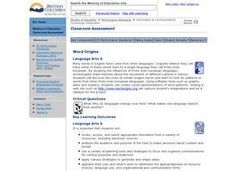Curated OER
How to "Read" an Artifact
Students discuss the types of information they can get from artifacts. In groups, they practice "reading" artifacts and determining their usage. They use inferences to test against official information about certain pieces. They also...
Curated OER
Petroglyphs and Pictographs
Fourth graders make necklaces out of petroglyphs that they stamp into clay. In this petroglyphs lesson plan, 4th graders draw designs and explain where they come from as well.
Curated OER
Greek Vase Painting Project
Students create authentic Greek paintings on clay tiles using knowledge learned about Greek art and painting techniques. This lesson is highly adaptable and can be accomplished in less than a week if focus is altered and less time is...
Curated OER
Dinosaur Eggs
Students hunt for dinosaur eggs that the teacher has made and hidden on the playground. students open the eggs to find the dinosaur inside and experience archeology first hand.
Curated OER
Archeology: Weapons of the Texanos
Students develop archaeological context skills through a simulation which places them in the year 2500. After listening to the teacher read, "Weapons of the Texanos," they record what they think the weapon is. Next, in groups, they...
Curated OER
Male Nok Head SculptureNigeria, Africa
Sixth graders create sculpture. In this visual arts lesson, 6th graders design and create Nok sculptures that feature patterns and textures in the style of the Nok culture.
Curated OER
Before It Was Wisconsin-Rock Art
Students examine how archaeologists make use of all forms of artifacts including rock art to try to piece together past cultures. They make their own rock art so they have a feel for how such pieces were made out of natural materials.
Curated OER
Environmental Art
Pupils expand their definition of art, become familiar with various examples and concepts of environmental art, and create their own work of environmental art.
Curated OER
Indians in Georgia: How Do We Know What We Know?
Students discover archaeology by investigating the history of Native Americans in Georgia. In this U.S. history lesson, students participate in a mock archaeological excavation in their classroom by recovering artifacts and...
Curated OER
Mystery of the Maya
Students examine a piece of pottery and make conclusions about the culture. They demonstrate the skills used in digging at a dig site. They also make inferences about the responsibility archaeologists have when excavating a site.
Curated OER
Language Arts- Word Origins
Sixth graders locate, access, and select appropriate information from a variety of resources, including electronic sources. They analyze the audience and purpose of the task to make decisions about content and format.
Curated OER
Finding James Fort
Welcome to Jamestown! Third and fourth graders read and analyze primary source documents about Jamestown or Fort James. They read and analyze descriptions of Fort James from primary sources. They access a website to explore more...
Curated OER
Archeology Lesson; Making Inferences
Young scholars discover what an archeologist is and make inferences about societies and cultures based on artifacts. In this archeology lesson, students complete an array of captivating activities, guessing about what an...
Curated OER
Ancient Man in Asia
Seventh graders analyze and synthesize information about major historical developments by interpreting data, evaluation sources of information, identifying and comparing experiences and perspectives from multiple cultural perspectives.
Curated OER
Name That Point!
Pupils compare projectile point attributes, identify and classify points, and match projectile points to a chronology.
Curated OER
Ceramics: A Vessel Into History
Students review a previous ceramics instructional activity and journal about a personal clay vessel they will create. In this ceramics instructional activity, students recognize various ceramic forms created in...
Curated OER
Archeology of the Future
Students are introduced to the basic vocabulary of archeology. Using the vocabulary, they classify artifacts and make inferences about their uses. In groups, they create a chart for the criteria needed to analyze artifacts and share...
Curated OER
Hands-on History of Pottery
Young scholars make pottery in the same evolutionary order as archeology indicates. They begin with simple pinch pots and then move to plain coil pots, manipulative decoration, and surface decoration. For each type of pot they discuss...
Curated OER
Vocabulary bingo
Middle schoolers participate in a game in which they practice vocabulary associated with the archeological process. They create a set of index cards in which they list one vocabulary word and use a piece of candy to symbolize it already...
National First Ladies' Library
King Tut and All That
Young scholars study the field of Egyptology and archeology. They create an artifact for posterity and create a special edition that tells the story in words, maps, and pictures. They create a storyboard for a "comic book" edition of the...
Curated OER
Archaeology is ...
Students demonstrate the importance of context for learning about ancient people. They assess the importance of preservation of cultural resources. They exchange papers with a student in class. The students with the paper are responsible...
Channel Islands Film
Arlington Springs Man: Lesson Plan 1
Learning to craft quality questions is a skill that can be taught. Class members use the Question Formulation Technique to learn how to create and refine both closed-ended and open-ended questions. They then view West of the West's...
Channel Islands Film
Arlington Springs Man: Lesson Plan 3
Imagine being part of a team of scientists that discover the oldest human remains in North America. Imagine being part of the crew that documents this discovery. Class members get a change to be part of such an exciting adventure in a...
Curated OER
Tall Tales: Reconstructing A Personal Tell
Sixth graders discover the ways archaeologists examine artifacts and where they are found. After being introduced to new vocabulary, they use artifacts from their own lives and discover what could be told about their life from them. ...

























